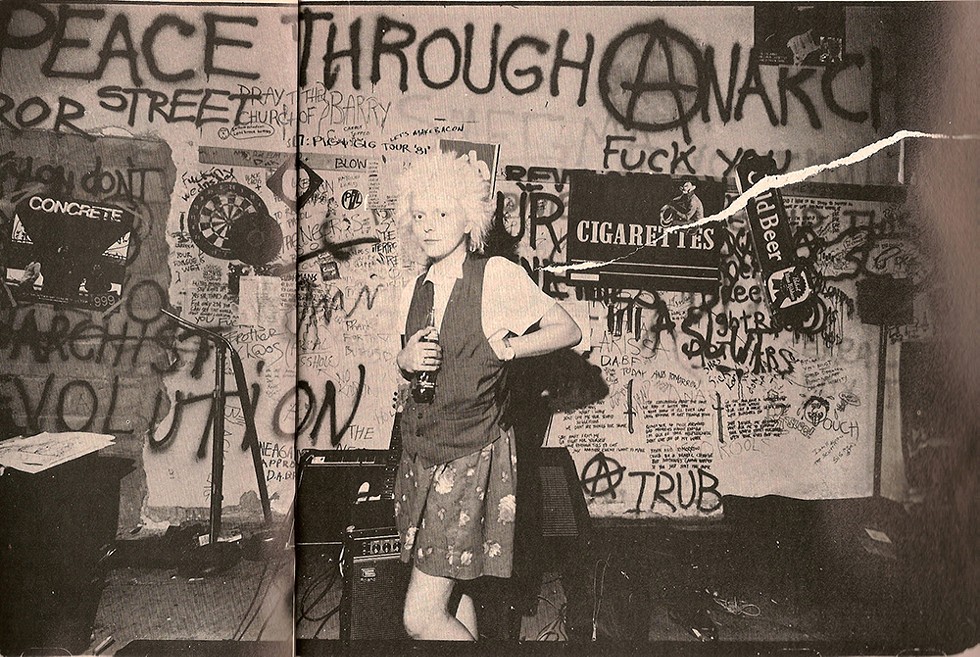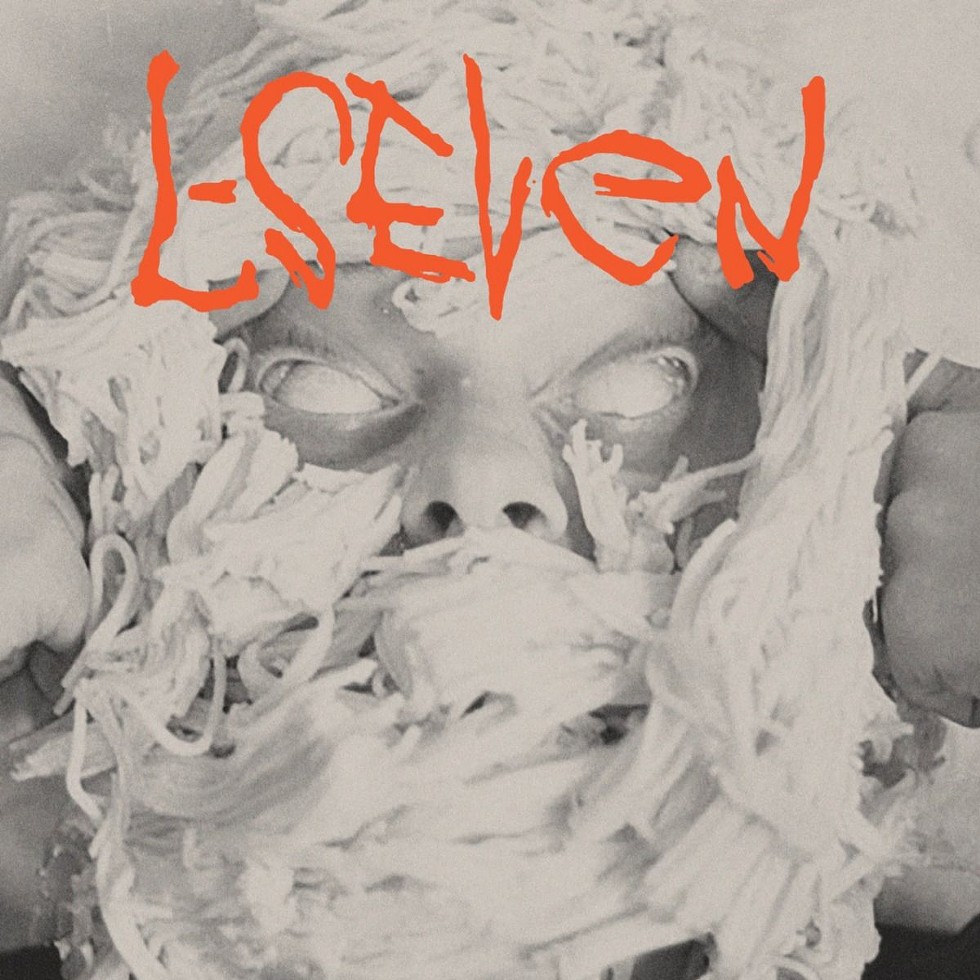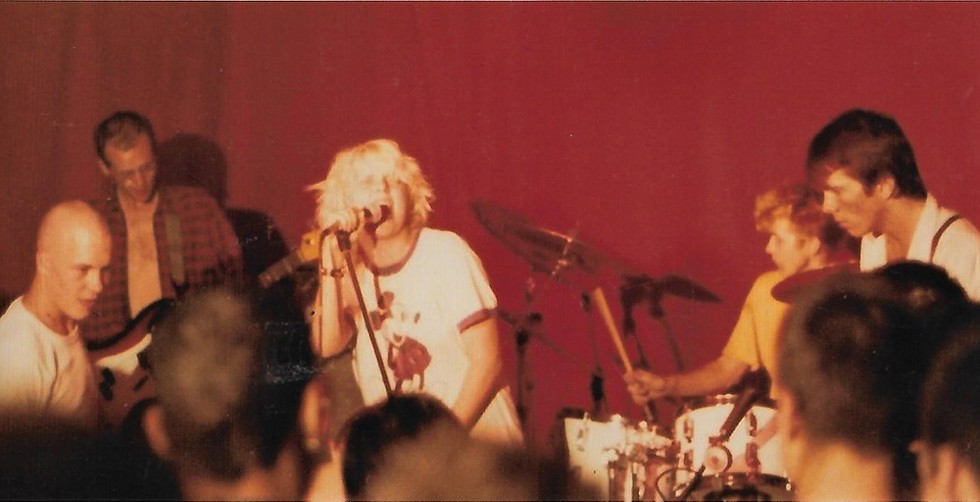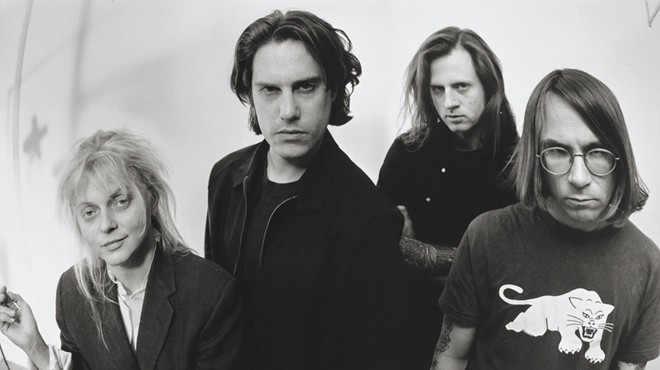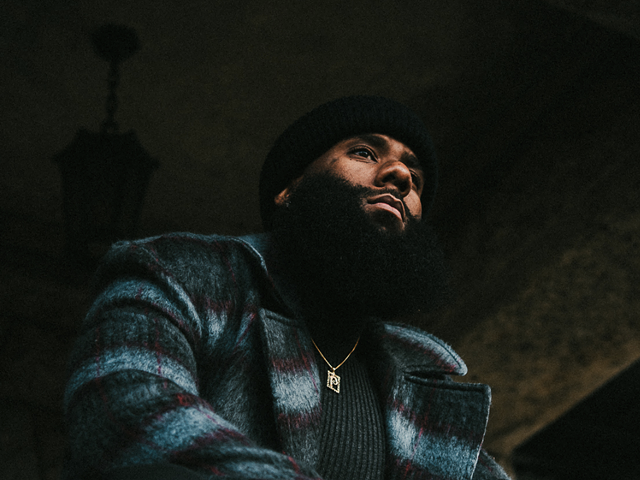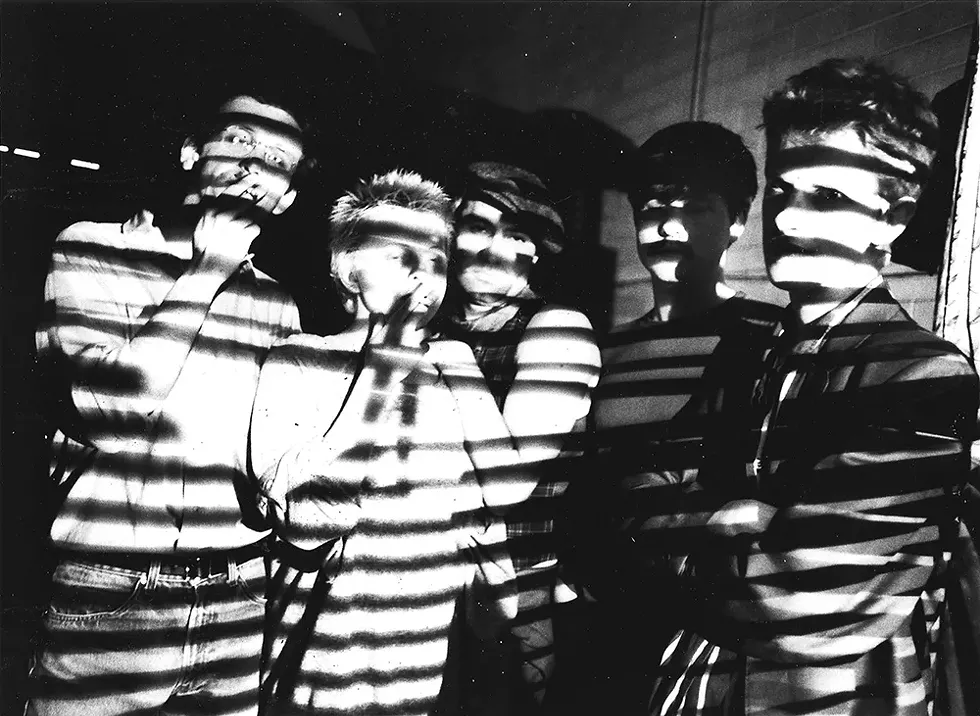
They warmed up for most of the important touring bands coming through Detroit in the early 1980s — the Gun Club, Killing Joke, the Stranglers, Iggy Pop, Bauhaus, U2, and the Birthday Party. But although post-punk band L-Seven never gained much recognition beyond Detroit, they were hugely inspirational to fellow musicians within the city's small, but active underground hardcore and punk scenes. The band became more well-known over time as the launching pad for singer Larissa Stolarchuk, who formed the Laughing Hyenas shortly after L-Seven's dissolution in 1983.
Last month, Jack White's Third Man Records put out a self-titled album of previously unreleased L-Seven recordings, presenting the two distinct incarnations of the band. In their lifetime, the band released only one three-song 7-inch on Touch and Go Records, which will be reissued by Third Man next year.
The new compilation lets the band rightly reclaim its place of importance in Detroit's music history.
The band started in the summer of 1980. Guitarist Dave Rice and drummer Michael "Smitty" Smith had left the band The Blind and were jamming above the bar Cafe Orleans on Jefferson Avenue. Down the street at the GOP national convention inside a newly christened Joe Louis Arena, Ronald Reagan was about to accept his party's nomination for president of the United States.
"Larissa came over with a bunch of her friends the next day and just hung out in the living room," Smith says. "She had a million fanzines. My God, I was hip to fanzines, but she was like an addict."
"One of my first memories of her is of us heckling the 1980 GOP conventioneers from the window of my flat on Jefferson Avenue," Rice says. Punks taunting Republicans in 1980 would get them in some trouble, though.
Recalls Rice, "One night, after a Robert Fripp show (August 10 at Harpos), me and my friends returned to the pad for the customary afterparty. This was a couple of days before the 1980 GOP convention was due to start and we spotted a guy in a suit and dark glasses on Jefferson Avenue, looking around and occasionally speaking into his lapel. At three in the morning, we decided to make him feel at home with gleeful shouts of 'Welcome, GOP!' and 'Secret Service rules!' at which [point] he disappeared."
"The next morning, [The Blind bandmate] Dave Davis was having a cup of coffee and watching his doberman, Cleopatra, run around on the roof of the adjacent building, when another guy in a suit and dark glasses stuck his head out of the skylight, looked around and went back down when Cleo started growling at him. A couple hours later, the landlord showed up screaming that we were running a whorehouse and dope den and that we had to get the hell out right away. Which, being naive 19-20 year-olds, we did. We really should've fought it in retrospect, but what the hell."
The band moved its practice space to Smith's father's business warehouse. The Gregory, Mayer & Thom Office Supplies warehouse was at 3511 W. Fort Street in the shadow of the Ambassador Bridge. The band set up shop in the warehouse's former flammable materials room.
At this point, Rice and Smith asked bassist Frank Callis to join the band. "I was working in an architecture office in downtown Detroit and ran into Dave, and I told him I wasn't with the band Retro anymore," he says. "So he invited me to come to the practice space."
Stolarchuk followed the band to the new space. "She was just there all the time," Smith says. "And she'd just sit in the corner with her magazines, writing poetry. But wherever she went, she always had this tiny little army with her. You could tell she was her own force of nature."
Lacking a vocalist, Rice and Smith simultaneously decided to ask the person in the room with a notebook of lyrics if she wanted to sing. "It turns out that was her plan the whole time," Smith says. "She said, 'It took you guys long enough to figure out that you should invite me in to sing for you.'
"She had some stuff written down that she titled 'Flowers of Romance,' and she just got up and sounded like an angel. She was not a trained vocalist. She was soft spoken with a very unique sound, but to say she just fit in perfectly with our whole post-punk, arty kind of thing is an understatement. Once she started singing ... we were just off to the races."
Rice concurs, "That was that. She was just super cool. We had to be a band then." Shortly afterward, the band asked saxophonist/keyboard player Charles McEvoy to join.
Given Callis, Rice, and Smith's connections with promoters Vince Bannon and Amir Daiza from their previous bands, and Stolarchuk's connections to the hardcore scene through her fanzine Anonymous, the band soon started playing a lot of high-profile gigs in the thriving, yet relatively small Detroit underground scene.
The first incarnation of the band was more strictly post-punk — the influence of the local hardcore scene would develop over time — and was more indebted to acts like James Chance, the Slits, Public Image Ltd, and Siouxsie and the Banshees. Rice's guitar sound shared some clear similarities with Siouxsie's guitarist John McKay and PiL's guitarist Keith Levene, but was brilliant and original in its own right.
The rhythm section was equally amazing. Like all good post-punk bands, the songs had undeniable and danceable grooves that frequently broke into tribal rhythms — something that would continue in the next version of the band. While New York post-punk's embrace of dance music was more directly inspired by its club scene, you could say L-Seven's inspiration was probably more Motown-inspired.
Stolarchuk didn't just love hardcore and the Sex Pistols — she also loved Michael Jackson's Off the Wall and Rick James. It's not a coincidence the band lifted its name from James' 1979 album Bustin' Out of L Seven.
Recordings of this incarnation of the band from a 1981 Lansing studio session appear on the first side of the compilation. The recordings are a clear celebration of their influences and their shared mixtapes: "Flowers of Romance" takes its title from that year's PiL album. "Maniac" is reminiscent of early XTC, "Rapping Tune" recalls Blondie's "Rapture," and "Brixton Shuffle" gives a nod to British ska revival in the verses. The tripped-out dub of "Klickety Klack" would fit perfectly on a Pop Group album, and "Lost In Paradise" sounds like a lost James Chance song with McEvoy's skronking saxophone. The effect of all these nods to influences, though, is far from mimicry. It's the sound of a band that could seemingly take on anything.
Negative Approach vocalist John Brannon, who would later join forces with Stolarchuk in the Laughing Hyenas, saw the first incarnation of L-Seven and was immediately won over. "Me and [original bassist] Pete Zelewski had just started Negative Approach and went to check them out at this free show on the Kern Block (Downtown Detroit Days, May 18, 1981)," he says. "We were blown away. We didn't know there were bands like that in Detroit. They were completely different and punk as fuck." (Ironically, L-Seven landed the gig after Smith described the band as "upbeat music with a touch of jazz" to the event promoters.)
At this point, however, Stolarchuk was already showing signs of a drug problem. "Larissa definitely had a drug problem from Day One," Smith recalls. "And it wasn't so much that it was escalating, as it just clearly was not going away." (Stolarchuk died in 2006.)
While many of the band members partook of marijuana or cocaine, Stolarchuk was already using heroin. Seeking something more stable, Smith left to join Figures on a Beach, and McEvoy departed the band shortly afterward in the summer of 1981. Figures on a Beach would sign to Sire Records in 1987.
On his way out, Smith recommended his replacement in the drum chair — Kory Clarke from the Attitudes. Scott Schuer, also from the Attitudes, joined L-Seven as a second guitarist. Recalls Sonic Youth drummer Steve Shelley of Clarke, "Kory was just a rock god. He was the cutest kid, with blonde peroxide-dyed hair. He kind of looked like Billy Idol, maybe a little bit better. And he just played the shit out of his drums. He was the greatest drummer."
"I was actually shocked that Frank would even consider me playing with them," Clarke says. "I think maybe Frank was afraid he was going to lose Dave Rice. So they got me and my rhythm guitarist (Schuer)."
Early on, Callis gave Clarke some key advice. As Clarke recalls in an interview with Rob St. Mary, "Frank said 'play more toms' to me. 'I'm telling you, you'll be better off playing those toms like that.' And he was right. To this day, I'm a better drummer for that." Hence the continuity of tribal rhythms in both versions of the band.
At this point, L-Seven's coexistence with Detroit's nascent hardcore scene would clearly influence their musical approach, yet it would also ultimately tear the band apart in time.
"We just started writing more," says Callis. "And our association with the young punk kids, who eventually coalesced into the Detroit hardcore scene — that really changed our sound. We got a lot harder and a lot faster."
The most spectacular and surprising example of this is L-Seven's cover of the Yardbirds' "Over Under Sideways Down," which became a frequent set closer for the band. It appears on the Third Man compilation from a soundboard recording of the second version of the band's opening slot for Iggy Pop at the Royal Oak Music Theatre on Aug. 23, 1981. Here, the band revs up the song to full-on mosh pit tempo. You can practically see the bodies colliding up front at the show. It gives the Yardbirds' classic mayhem-filled appearance in the movie Blow Up a run for the money. This definitely wasn't your dad's classic rock.
Four other songs from the show appear on the compilation. The band's song "Sixty Six Days" is also taken at pure hardcore tempo, though the song is far from a simple barre chord stomp; the sound is more Minutemen than Minor Threat. "Don't Be Lame" is reminiscent of the Bush Tetras, and "Human Truths" evokes early Siouxsie and the Banshees.
L-Seven's cover of the Misfits' "London Dungeon" at the show was another nod to their hardcore fans. Recalls Brannon, "They covered that a week after the 3 Hits From Hell EP came out. That'd always give a thrill to all the punk kids in the audience. That always stirred things up."
Stolarchuk had befriended Maumee, Ohio/honorary Detroit hardcore band the Necros through her fanzine Anonymous. The Necros were the first band to record for the Meatmen frontman Tesco Vee's fledgling Touch and Go Records in 1981, which started as an East Lansing fanzine in 1979. By 1981, Corey Rusk had joined the Necros as bassist and was assisting Tesco Vee in running the label. (In 1983 Tesco handed the label over to Corey and his future wife, Lisa.)
Even though L-Seven wasn't a hardcore band, Rusk thought they belonged on Touch and Go. "Releasing the L-Seven record was a dream for me," Rusk says. "Although all of the Touch and Go releases prior to the L-Seven record had been 7-inches by local hardcore bands, my musical tastes were much broader than the Touch and Go catalog in 1982 would suggest. Larissa was a dear friend, so it was easy to want to put out the L-Seven record based solely on that friendship. But more importantly, L-Seven were the most artistically creative and original local band at that time. In my mind, releasing their record felt mandatory. It showcased to Touch and Go's hardcore audience something totally different yet equally important."
In February 1982, L-Seven recorded their self-titled three-song EP at Multi Trac Studios at 25533 Five Mile Road in Redford. Neither of the two songs on the A-side hit the two-minute mark, and the entire EP is barely over seven minutes long. Still, it packs quite a punch.
The cover featured a jarring photo by Detroit hardcore scene photographer Dave O, depicting Stolarchuk with her eyes rolled back in her head as if taken over by spirits. The band's name was scrawled on the cover by Larissa in a childlike script. Looking at the sleeve, it was hard to miss that this was a punk record.
The A side's songs "Insanity" and "Secrets" come on fast in finest hardcore tradition but also take inspiration from the dance floor, like a lot of New York's post-punk of the era. This is especially apparent on the verse of the B-side's "Clear Vision," with its ESG-like groove. In pure L-Seven fashion, this transitions to a full-on hardcore thrash in the chorus by way of a bridge full of tribal drumming. In lesser hands, such disparate parts within a song would be a recipe for a train wreck. In L-Seven's hands, it's seamless and breathtaking.
A thousand copies were printed up, and the record was released on Touch and Go's Special Forces label to keep it distinct from the label's strictly hardcore releases at that point. It would remain the only release on Special Forces for Touch and Go. (The Special Forces label logo of a Sherman Tank on the EP was cut out from John Brannon's copy of T. Rex's Tanx album.) The next year Touch and Go would release the Butthole Surfers' first full-length studio album and continuously push the boundaries of rock 'n' roll after that.
By this point L-Seven's practice space/crash pad/venue, the Clubhouse at 416 W. Willis, had become an impromptu home for the Detroit hardcore scene after the Freezer Theater shut down in 1982. "We built the stage in the storefront, and it just started to take off," Schuer recalls. "Larissa was very much drawn to hardcore. It was a lot of good times. It was really a departure from where L-Seven came from when I joined, but it was a really good evolution to where the band finished."
Adds Clarke, "Larissa and Frank really knew what they were doing — they really had a huge input to where they wanted the soundscape to go."
Rice set up shop at the Clubhouse to record not only L-Seven but other bands with his TEAC 144 four-track cassette recorder (the first four-track cassette recorder in 1979). This gave Rice the opportunity to document and record a lot of bands that either lacked money for a "real" studio or didn't have access to a recording studio sympathetic to the radical and, at times, abrasive new sounds coming out of Detroit. Notes Rice, "It was an unusual thing to have back then."
In addition to L-Seven, Rice also recorded Negative Approach, the Necros, Bored Youth, Allied, and Shelley's band Strange Fruit. "At that point, the whole concept of lo-fi just didn't exist," Rice says. "If it wasn't recorded in a studio with surly dudes with mustaches and feathered hair who hated punk, it couldn't be released. That was just kind of the mindset of almost everyone at that point. It kind of sucks cause there was a lot of stuff that was pretty amazing but wasn't major label quality — but it would have been nice to have some of that see the light of day."
Clarke adds, "Dave was always really good at that stuff, and his four-track sounded great."
Two songs from the Clubhouse appear on the compilation. "Mental Game" starts with a dark tremolo dive on the guitar that morphs into noisey Andy Gill-like single-note guitar lines before Stolarchuk belts out the chorus.
"Mr. Hell" prophetically invokes some serious Birthday Party vibes with its overdriven surf guitar backed by a drunken-sailor-on-drums rhythm. The Birthday Party would end up marking a fitting ending point for L-Seven and the seed for the founding of the Laughing Hyenas — but more on that later.
A limited-edition version of the album contains a bonus four-song 7-inch also recorded at the Clubhouse. "Poor Thing" features Clarke's most frenetic drumming in the band. There's also an even wilder version of "Clear Vision" originally on their Touch and Go EP, and "No One" is reminiscent of classic Wire. The highlight, though, is the crudest recording on the 7-inch — an audience tape of Brannon singing with the band on a cover of "You Drive Me Nervous" from Alice Cooper's classic Killer album.
Given that Brannon's high school band Static was, in part, an act of Cooper worship, he had to join in after he heard them cover the song. (We're told Static recordings may see the light of day via Third Man.) "I was so in awe of L-Seven because there's always so much going on with an Alice Cooper song, but they had the technical abilities to actually pull it off," Brannon says. "I kept begging them like, 'Well, you gotta let me sing this with you guys.'"
Brannon himself had moved into the Clubhouse at this point. After a Necros/Bored Youth show at Nunzio's got canceled, he invited the bands to come play in the basement at his house in Grosse Pointe. His mother was out of town. Except she came home early — and kicked Brannon out of the house.
"I took the bus downtown. It was 50 cents. I walked over to the Clubhouse from the station and asked Larissa if I could crash," he says. Given that Brannon was infatuated with Stolarchuk, it's not surprising their friendship morphed into a relationship shortly thereafter.
While L-Seven played a lot of shows in the Detroit area, they never toured extensively. One big exception was a brief impromptu tour with the Gun Club. Recalls Callis, "In between sets (on Aug.6 , 1982) at Clutch Cargo's (then at the Women's City Club on the corner of Park and Elizabeth) our manager Ken Waagner befriended (Gun Club lead vocalist/guitarist) Jeffrey Lee Pierce. Ken came back to me and said, 'These guys are stranded. Their van broke down.' I said, 'Ken, make them an offer they can't refuse.' We told them we'd drive them to Chicago if they'd get us on the bill. We played Chicago, Madison, Milwaukee, and Minneapolis with them. We had a great time with them."
Shelley remembers a much less fun weekend when he and the Crucifucks shared the bill with L-Seven. "We went to London, Ontario, together and had a kind of a crazy long weekend of just getting hassled by Canadians. I'm sure London is an awesome place now, but the bar that we were playing had a redneck mentality, and they were hassling musicians a lot. Maybe it was a redneck bar. It just seemed like trouble was brewing all the time. So it was just a very bizarre little weekend that felt like a week with L-Seven. And I think that really cemented our friendships back then."
“That gig was such a thrill. God, there were only 50 people there. Yet everyone claims they were there. It was one of those gigs where people say, ‘I was at that gig.’ No, you weren’t. ’Cause I was.”
tweet this
Reacting to Shelley's story, Callis concurs. "He didn't go into quite as much detail as he could," he says. "And I'm glad he didn't."
Back in Detroit, the hometown hardcore crowd had taken to hassling Clarke as that scene became more rigid and intolerant. And differences between Clarke and Stolarchuk started to form a rift within the band, as well.
"Larissa seemed to lose interest in the band altogether," Callis says. "She was deep in with the hardcore kids. And there was quite a bit of friction between her and Kory." Callis elaborated in an interview with Rob St. Mary. "Kory has reason to be angry," he says. "He got a lot of abuse from the hardcore kids. It's too bad. A lot of it was just about cliques. And Kory was a very talented drummer. It was great playing with him; he was a fun guy. But I think he was jealous of the time Larissa was spending with the Necros, and he thought she should be more devoted to our band. And I think we all thought that."
To Callis, it seemed that the band had run its course. "At the same time, my life was changing," he says. "I was older than those guys. I was in my late 20s, they were just getting into their 20s. During the big year of L-Seven, I was actually living on unemployment, which was great because I could live the life of a rock star. But once winter started setting in, that was running out. I had to get a job. I broke up with my girlfriend. My father died. We got broken into, and all of our equipment got stolen. (The Clubhouse was actually broken into twice.) So it just didn't look like anything was going to happen because of the rift between Larissa and Kory. I quit the band at that point (toward the end of '82), and that was kind of what ended L-Seven."
But that wasn't exactly the end of the band. They went out with a bang — granted, only 50 people were probably at the show. But it was a show for the Detroit music history books.
L-Seven had been offered a gig warming up for the Birthday Party at Traxx (14050 Gratiot Avenue) on March 25, 1983. "We actually re-formed to open for them, minus Kory, because I didn't think we could ever get him and Larissa on stage together again," Callis recalls. "We borrowed the drummer from Negative Approach (Chris "OP" Moore). Negative Approach used to play with us (and share a practice space) and he was familiar with the material. We did a really great show with him." Shelley had auditioned for the band after Clarke's departure, but his plans to stay in Midland probably sank the gig for him. He would do alright when he moved to New York City in two years and joined Sonic Youth.
"Chris kind of knew all the tunes just from seeing them live and the fact that we shared a rehearsal space," Brannon says. "He gave it his all, and it came across great, man. That gig was such a thrill. God, there were only 50 people there. Yet everyone claims they were there. It was one of those gigs, like the Misfits at the Freezer Theater, where people say, 'I was at that gig.' No, you weren't. 'Cause I was."
Even though it was lightly attended, the importance of the gig was the impact it would have on Brannon and Stolarchuk. The show literally changed their lives. It was the genesis of the Laughing Hyenas.
"It was one of those magical gigs, and I'm just glad I was there," Brannon says. "I got to go down there early, see the soundcheck and watch Nick Cave drink a bottle of Wild Turkey in like two seconds. They had all their girlfriends there. Anita Lane was there. It was wintertime. I remember they all had full-length mink coats on. We were just in awe just to be there."
The show was practically a conversion experience for Brannon and Stolarchuk. "We were like, 'My god, this is the future of rock 'n' roll,'" Brannon says. "It was right when [Negative Approach's first album] Tied Down came out. I started rethinking things then because I really held them as the future of rock 'n' roll." It was a fitting end for L-Seven.
Shortly afterward, Brannon and Stolarchuk would drive off to resettle in Ann Arbor and start the Laughing Hyenas. Larissa would switch her last name to Strickland and emerge as one of the most powerful Detroit rock guitarists ever. Wisely, they left the singing duties to Brannon — one of the most powerful Detroit rock vocalists ever. Not surprisingly, they also insisted their drummer bash the hell out of his toms — and his drums in general — not unlike L-Seven.
Callis returned to work in architecture. Clarke moved to New York City in 1984. In 1987, he formed the decidedly more metal Warrior Soul, where he stepped out from behind the drums as the frontman/vocalist. Warrior Soul went on to sign with Geffen Records subsidiary DGC in 1989.
Rice moved out to California, where he ended up auditioning as a touring guitarist for Public Image Ltd in 1984 to replace his idol, Keith Levene. Sadly, the tour ended up getting canceled. He formed Sandy Duncan's Eye shortly afterward. These days, Schuer teaches writing at Washtenaw Community College. Smith relocated to the Boston area, though he returns to Detroit with Rice annually for the Detroit All-Star Garage Rock Punk Revue in non-pandemic times.
Shelley had the original idea to put out a compilation of unreleased L-Seven recordings about a decade ago. The Sonic Youth drummer also runs Smells Like Records, which put out the first Cat Power and Blonde Redhead records. Fittingly, it started with Shelley listening to some old cassette recordings of L-Seven.
"Larissa was a scene leader, and she would tell you about the cool import or indie records," Shelley says. "She must have spent all her money on records. But we couldn't afford all the records back then because they were so expensive. So making and exchanging mix tapes for one another was a very real thing."
That was how Shelley uncovered the lost recordings. "One day I was just looking over these cassettes that had stayed with me through the years, and I had these cassettes that had L-Seven scribbled on them," he says. "And it was a bunch of the songs that wound up on the Third Man LP. That was how we listened to each other's bands then because we didn't all have albums out at that time."
"I started collecting pieces of the record. Dave Rice still had a lot of the audio. And I would go online and collect whatever I could and my collection started getting pretty good. I started doing interviews with different band members trying to make a special package for the guys because I really wanted to put out something important. But then the record industry kind of died. And it was really hard for me to put out records anymore. I'm only able to do one every couple of years right now."
Enter Third Man Records' Dave Buick. "I picked up the L-Seven single originally because of its connection to the hardcore scene," he says. "It quickly became one of my favorite Detroit singles."
"I had heard that Steve Shelley at one point was going to do a comp, but I never really knew for sure what was going on. After I had started working at Third Man, I was home alone one night listening to records and I Facebook messaged Dave Rice. He wrote me back right away. Dave offered to get ahold of Steve, but I just blind Facebooked Steve, told him who I was and that I would love to work on it with him. We talked and he told me how it was a passion project for him. He basically just gave it to us. So Steve and I took credit as producers of the comp."
Shelley had gathered a lot of the artwork, and transferred all of the tapes that Rice and Callis had sent him. Warren Defever cleaned up the mixes and mastered them for vinyl. "We decided to keep the artwork cool and sort of simple — sort of on the punk side, and it looks great," Buick says.
The compilation is an important chapter to add to an under-documented part of Detroit's music history. The Romantics were the only band out of Detroit's punk/post-punk/new wave scene to break through nationally at the time. Negative Approach, Destroy All Monsters, and Sonic's Rendezvous Band all received belated recognition after their demise. Touch and Go fanzines have been anthologized. But the music of a lot of the other bands from the scene is hard to find, and information is even harder to dig up on the internet.
The documentation of Detroit's '80s punk scene has been improving recently. Third Man Records issued an Algebra Mothers compilation in 2018 (Dave Rice was also in that band). Orbit Magazine Anthology author Rob St. Mary put together the indispensable Detroit Punk Archive website and this year released the fantastic End of the Night (1976-1983) double album compilation with the help of a Knight Foundation grant. A documentary about the Detroit hardcore scene called Dope, Hookers and Pavement was supposed to premiere at the Detroit Film Festival last April but is in pandemic limbo at the moment.
Not only is the punk/post-punk/hardcore music from the '80s important in its own right — it also built the foundation for indie rock to take over in the '90s. Those bands kicked open the studio doors to let in new sounds, and along with the hardcore bands, they built up the touring network that all the indie bands tapped into in the '90s. It's no coincidence that three of the pivotal hardcore labels — Touch and Go, Dischord, and SST — became three of the pivotal indie labels of the late '80s and '90s.
It's also no coincidence that two of the big Detroit indie bands of the late '80's/early '90s, the Laughing Hyenas and Big Chief, rose from the ashes of Negative Approach and the Necros — two bands that worshipped L-Seven.
"I wish that L-Seven had got to play to more people around the world," says Shelley. "Because I think more people would have felt the way that I feel about them."
We have a new events newsletter! Find out the best things to do in the area every Thursday in your inbox.

